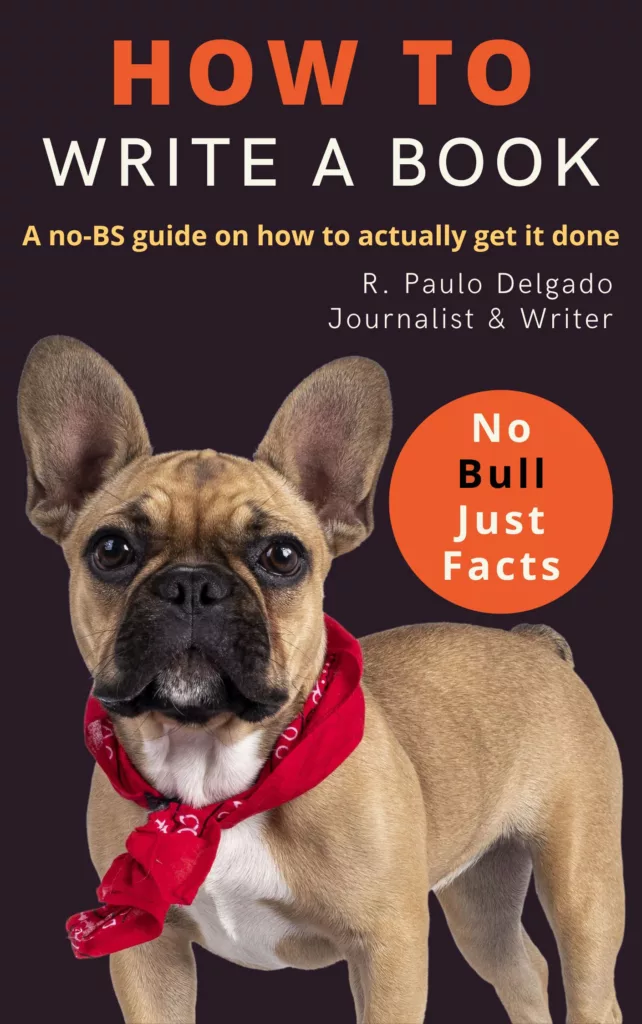Get the straight facts about paying someone to write your book. If you understand these, your book project is much more likely to succeed.

This is a definitive, no-frills guide about paying someone to write a book, what chances it has of success, and how to publish it.
I wrote it succinctly and factually. There’s no sales talk here. Done properly, writing a book can be highly rewarding for both the ghostwriter and the author (you). Done without fully understanding what you’re in for can result in a project that no one wants to touch.
And if you’d like to chat about writing your book, contact me here for a free discovery call. No obligations. No pressure.
First: Why are you writing a book?

Before you start writing a book, you should make sure you’re doing it for the right reason: The only good reason to write a book is that you have an important story to tell.
There is a 99.99% chance a book will cost you more to produce than you’ll make out of it.
I promised you no sales talk: If the book is written properly, you’ll get your payback in personal satisfaction, a sense of achievement, and perhaps even a feeling that you’ve done something meaningful for the world.
But rarely in cash.
If you start off with that assumption, then you’ll focus on the quality of the book. High-quality books are far more likely to make you (or your business) money than low-quality books. If you focus on the ROI (Return on Investment), you’ll forget the quality. Low-quality books never make money.
A high-quality book that makes no money is something you can still be proud of. You’ll show it to people. They’ll remember you by it. Likely, the book will inspire people who read it.
A low-quality book that makes no money is an embarrassment. You’ll want to hide it, but you can’t.
Focus on quality.
If you really, really want to make money with your book…
There’s something called a “lead generation” book. The sole purpose of such a book is to get leads for your business. These ebooks are normally given away for free. They’re usually very short. They aren’t memoirs. Their quality leaves much to be desired. Hemingway would roll in his grave if he read such a book.
But, yes, these are specifically designed to attract people to a business. They often have catchy titles. People type their email address into a website and then get the book for free. The book then attempts to sell them additional services.
What about publishing deals?

If you’re not Bill Gates or Elon Musk, you’ll unlikely get a publishing deal for your book.
Non-fiction publishing is a brutal business. And it’s not friendly to unknown authors.
Advances are also rare for new authors, certainly significant ones.
There are exceptions to every rule. And no one would be happier than I if your book (a) made you lots of money or (b) got picked up by a publisher.
But this is unlikely to happen.
Write your book because you have a story to tell.
So, if books don’t pay and they rarely get pro-published, why write one?

Because they’re beautiful.
And because nothing can tell your story the way a book can.
Humans are apparently hardwired to consume stories.
In terms of price, hiring a team to make a movie of your story would cost far more. And the film would only capture parts of your life, not every detail.
People live an average of 75(ish) years. But stories live on. We’re still recounting The Odyssey. That story’s 3,000 years old.
You should write a book because you have something to say, want it said well, and want it remembered.
Nothing communicates a life’s intimate and intricate details and all its lessons like a book does.
Your book is your legacy. Make it meaningful and sincere.
These days, self-publishing is an entirely respectable way to publish a book. For a moderate fee, you can get an exquisite cover created for it. You can give it to family members as a birthday present, or simply leave it behind for your descendants.
I’m not only talking about memoirs. Even a book that covers some technical subject you’re involved in can be meaningfully written.
If you want to write a self-help book based on the lessons you’ve learned, you can find ways to distribute that book so that it really helps people.
Such books might indeed end up being profitable. But never count on that, or else you open up your heart to being broken. Write a book that means something to you.
Raw numbers—what does it cost?

Okay, let’s talk numbers. Ghostwriters charge different prices, but you’re unlikely to find a good-quality ghostwriter who charges less than $0.50/word. For a book of 30,000 words (approximately 120 pages), that’s $15,000. For 60,000 words. it’s $30,000.
So, how long is a book? Well, some stories need 20,000 words, and others need 60,000 words. The two bits of good news are:
- An experienced ghostwriter will usually know pretty accurately how many words your story will need before you start the project.
- People usually overestimate the length of their own stories. If you think your story needs 30,000 words, it can probably be told excellently in 20,000 words.
Now, note that I said good ghostwriters. Excellent ghostwriters usually charge $1. Celebrity ghostwriters can charge $3, $4, or many more dollars a word.
But if you’re reading this, I assume you’re not a celebrity. (And, if you are, here’s a pro tip: You can probably get a publishing deal, a big fat advance, and the publishing house would pay your ghostwriting fees for you. So you don’t need to read this. It’s tougher on us “non-famous” people. 😅)
Ghostwriting fees also sometimes depend on how busy the ghostwriter is. A ghostwriter who turns down a $0.50/word project today might accept that same project in three months. Or they might go down to $0.40.
But the opposite can also be true. Some ghostwriters are so busy that their pricing steadily rises month after month. It’s often best to catch them now, pay them a deposit, and secure the project for later at the current rate.
What about sharing royalties?
If you’re not a big name, you’re unlikely to get a ghostwriter to write a book on this basis. If you’re a celebrity then, yes, this can be a common form of payment.
The type of story determines the ghostwriting price

Writing a memoir is different from writing a technical book or a self-help book. Each type of book has factors that affect the price per word.
Some rules of thumb are:
- The more info you give the ghostwriter, the lower the price per word will likely be.
- The more independent research the ghostwriter has to do, the higher the price.
Memoirs are typically the easiest to write because it’s all based on interviews. But if you need the ghostwriter to dig into historical events or to simplify highly technical concepts, then the price will usually be higher.
Other factors affecting the price
Probably the single most significant factor affecting the price, second to the book’s genre, is the number of revisions the work needs.
I’ve worked on books where the author left it all up to me. I’ve also worked on books where the author wanted to change every paragraph. The latter is far more time-consuming; it’s also less rewarding for the ghostwriter because it ruins the flow of the work. And it costs the most.
If you feel the urge to change everything a ghostwriter writes, you should probably try writing the book yourself because it means you’ve got writer’s blood in your veins. I don’t envy you. Writing is a tough show, but some of us are fated to do it. 😁
In the past, I’ve compensated for “potentially many revisions” by charging a higher upfront price. But this isn’t fair on those people who don’t insist on revisions.
One way around this is to charge a price for the initial draft and then a second price for revisions. Another way is to start small and see how you and the ghostwriter work together. Both the author and the ghostwriter will know a lot better how they work together after a month of collaboration.
The keyword is teamwork. Even if you don’t contribute to the writing itself, a successful ghostwriting project is one of professional collaboration. Trust is vital in a ghostwriting project. The ghostwriter is not interested in overcharging you because that leads to dissatisfaction. The solution is full transparency throughout the project and always remaining open about what is needed for both parties.
Fiction versus non-fiction

Occasionally, people want a fiction novel ghostwritten. This doesn’t really work.
Ghostwriting is quite common in non-fiction. One ghostwriter estimated that about 70% of non-fiction books are ghostwritten. (Unfortunately, I don’t have the link to that article now. It was in a news article.)
In fiction, ghostwriting is rare. When it happens, it’s usually for a well-known series. Some of The Vampire Diaries was ghostwritten when there was a problem with the author writing later installments. The author was part of the brand, so they didn’t want to take her name off the cover of the book. They paid another writer to write a few of the books for her.
But first-time fiction books are never ghostwritten. There just isn’t a financially sound reason for it.
I’ve ghostwritten fiction stories before. But, here, the love of the story is even more important than non-fiction. That book will almost certainly not be profitable when you take into account the ghostwriting fees.
You can hire cheap writers on freelance websites for fiction novels. But, really, what’s the point?
How long does ghostwriting a book take?

Several factors affect the time it takes to write a collaborative book. The primary factors are:
- How available the author is for interviews and verifying the content
- How much research needs to be done by the ghostwriter
- How technical the work is
- How long the story is
If I have all the data necessary to write the book and no other work on my plate, I can do a high-quality book of about 30,000 words in one month.
More often, the project is spread out over several months. A full-length novel of approximately 80,000 words is usually a six-month project.
How does ghostwriting work? Who does what?

Generally speaking, the ghostwriting process goes as follows:
- Extensive recorded interviews.
- Ghostwriter prepares an outline.
- Author signs off on the outline.
- Ghostwriter writes a chapter.
- Author corrects major errors or deviations from what is expected (e.g. “That really doesn’t sound like me.”)
- Ghostwriter rewrites the chapter until it is “Mostly correct.”
- Ghostwriter writes one or two more chapters, repeating steps 5 and 6.
- As the ghostwriter gets better at emulating the author’s voice, the ghostwriter will write more.
- During all this time, lots of collaboration and ideas usually go back and forth, either as text messages, emails, or calls. Although, some authors prefer not to be bothered with the details. A pro ghostwriter will adjust to your workflow, but some input will always be needed eventually from the author. It’s your book, after all.
- Eventually, the first draft is ready. The author then looks it over for major deviations from what is expected. The ghostwriter fixes these.
- The second, third, and fourth drafts then cover mostly polishing the story.
Ghostwriting is a living process. There’s no fixed formula. Communication and collaboration are the keywords. But the above is more or less how it goes.
Sometimes, an editor is hired. In the end, someone needs to proofread the work, so the ghostwriter might hire a proofreader. If the work will be self-published, someone needs to design a cover. The ghostwriter will usually have contacts to help with these things.
It’s rare that a ghostwriter will emulate the author’s voice perfectly without help. Ideally, the author reads through the entire work and makes notes after the first draft.
All books need to be marketed, even books written “solely for your family”—you at least need to “market” that book to your family members. “Hey, I wrote this book. Read it!” That’s family-style marketing. 😂
Is there a contract?
There’s almost always some kind of written agreement. Some ghostwriters use more formal contracts than others. The contract typically covers the basics such as copyright, payment terms, plagiarism clauses, etc.
Whose name goes on the book? Who gets the copyright?
This is usually covered in the contract/agreement. Typically, all copyrights get transferred to the author once payment has been completed. Some ghostwriters offer discounts if they can put their name on the book. The name is usually added as “as told to” or a “co-written with.”
Ghostwriting payment schedule
Ghostwriters typically accept a non-refundable deposit to secure their services for a later date. And then payments are spread out over the duration of the project.
Some ghostwriting companies insist on agreeing to the full contract. We don’t:. With us, you don’t need to commit to the entire project, but you must pay each installment upfront. This forces us to deliver stellar work so that you want to keep the project going, and it lowers the burden of initial commitment for you.
At the end of each phase, we ensure there’s a tangible deliverable so you can take any work done to another ghostwriter and pick it up from there if you’re unhappy.
What guarantees come with ghostwriting?
The only guarantee any ghostwriter can give you is that the book will be written to the best of the ghostwriter’s ability.
Not even major publishing houses can guarantee anything for you.
Yes, book writing and publishing is a brutal business. That’s why you should write the book you love. If you do that, you’ll always win, because the story itself wins.
A ghostwriter offers professional writing services, not publishing services. If you’re looking for publishing services, you need to contact a literary agent. They also won’t offer you any guarantees.
And what about ChatGPT?

ChatGPT cannot write your memoir for you. It might do okay with a technical book, but it’s technically impossible for it to write your memoir unless you feed it the written content that it must then process. But, if you feed it written content, you’ve already written the novel. So using it becomes pointless.
What publishing options exist?
There are three types of publishing:
- Traditional
- Self-publishing
- Hybrid publishing
In traditional publishing, a publisher sometimes gives you money (an “advance”) to write your book. They then market the book briefly (a few weeks) after it’s published. They’ll tell you that you’re ultimately responsible for marketing your own book. Their advances aren’t typically very high for new authors. Fiction advances are usually quite high.
Traditional publishers have salespeople who try and get your book into physical bookstores. They cover all printing costs but these come off your royalties.
Self-publishing is when you go to a platform like Amazon that lets you upload a manuscript and cover and click the “Publish” button. Your book is then available in their marketplace, usually as an ebook. It’s also possible to self-publish paperbacks.
“Vanity Publishers” offer a self-publishing service for you. You pay them some money, and they upload your manuscript and design a cover for you. Any ghostwriter will know how this works so you don’t have to pay a vanity publisher.
Hybrid publishers are a mix of traditional publishers and self-publishing. You pay them, but they market your book to bookstores and try to get it placed in them.
Now you know. So, now what?
I tried to make this post comprehensive and cover all the questions I get asked about ghostwriting projects. If there’s a question I didn’t cover, let me know and I’ll add it.
Ghostwriting is a collaborative effort. The ghostwriter and author usually end up becoming great friends by the end of the project. The story is their guide. And every decision should benefit the quality of the story.
If you’d like to learn more about getting your book ghostwritten, please contact me for a no-obligation discovery call. I’d love to know about your story.
##
About the Author
R. Paulo Delgado is a freelance writer and journalist, ghostwriter, and CEO of Again, With Feeling. His work has appeared in nft now, Moneyweb, Forbes, Entrepreneur, Nordic Fintech Magazine, Business Insider, and many other publications. He has written over 35 books, mostly fiction.


